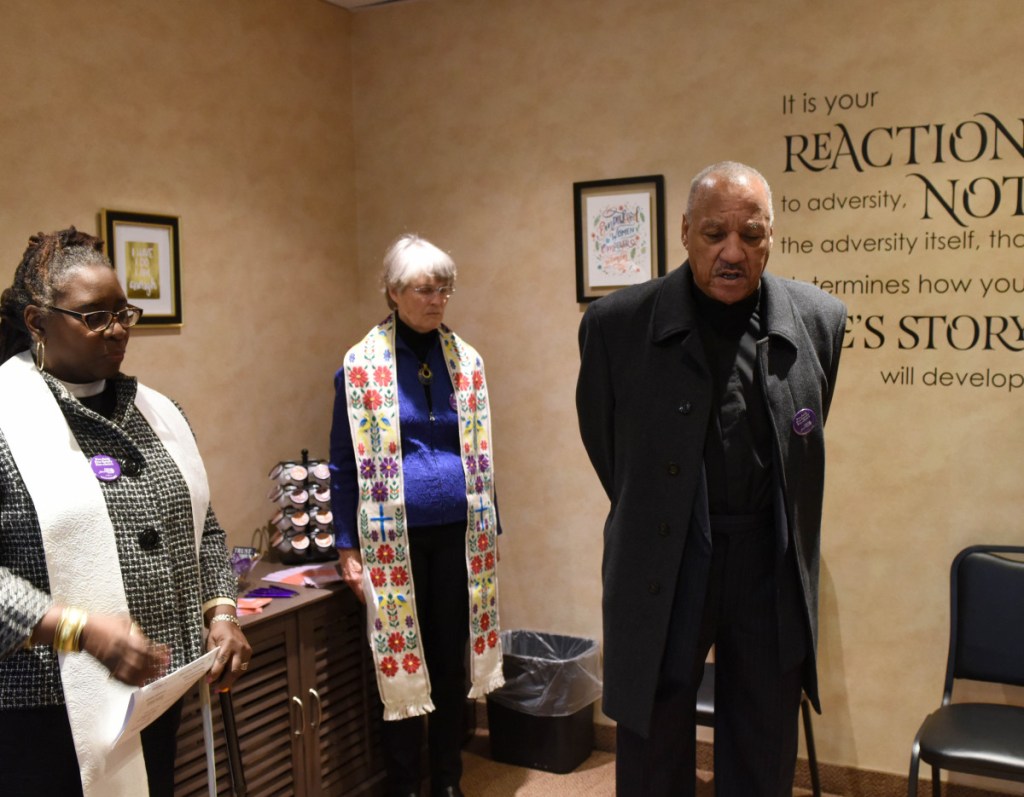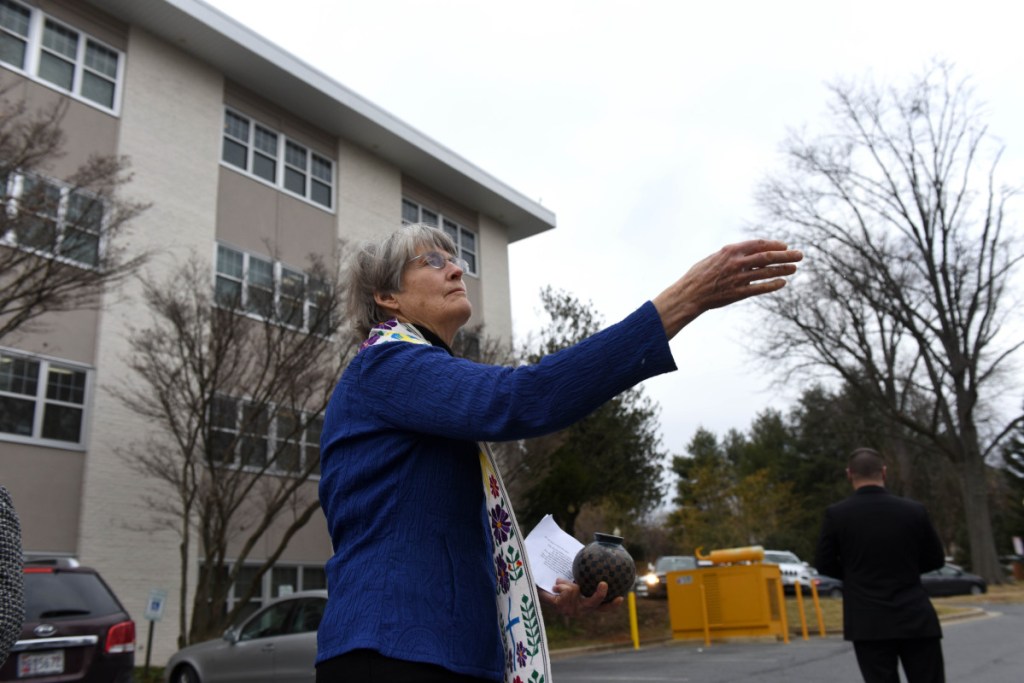When clergy gather at an abortion clinic, it’s usually in protest, outside the building.
Rarely are they huddled inside the clinic, not to condemn but to bless the procedures that happen there.
Yet that was the Rev. Carlton Veazey’s task as he led a prayer in Bethesda, Maryland on Monday: “God of grace and God of glory, in whom we move and live,” he said, as he opened a prayer for the well-being of doctors and nurses who facilitate abortions at the Bethesda clinic, and for their patients. “Keep them safe and keep them strong. And may they always know that all that they do is for Thy glory.”
Veazey was one of four Christian pastors and one rabbi who gathered to bless the Bethesda abortion clinic, in an unusual interfaith ceremony. The Hindu priest who was supposed to attend from a local temple, who has blessed an abortion clinic before, didn’t make it this time.
Opinions on the morality of abortion differ drastically by faith. Catholicism and some Protestant denominations teach that life begins from the first moment of conception and abortion at any stage is akin to murder; other Protestants and teachings from several other faiths disagree with that definition of life, and emphasize instead the sanctity of the health and the free will of women.
NOT ONE-SIDED
“Jewish rabbinic authorities, starting with the Middle Ages, say that a fetus is not a person,” said Rabbi Charles Feinberg, who is retired from Adas Israel synagogue, after participating in the ceremony. “Judaism has always said abortion is never murder. It may not be permitted, depending on the circumstances – how far along the pregnancy is, how seriously ill the mother-to-be is – but it is never murder. It only becomes that once the baby is born.”
And yet common conversation about abortion tends to cast it as a question of faith on just one side – the anti-abortion side – versus secular liberalism on the other. The clergy at this ceremony said that’s not the case. Many women who seek abortions are people of faith, who pray about their decision, the clergy said.
LeRoy Carhart, the doctor at this clinic, said he hears many of those prayers. “They’ll sit on the table and say, ‘Is God going to forgive me?’ I’ll say, ‘I take it you’ve prayed a lot about this.’ They all say yes.”
Carhart, a Nebraska doctor, operated a clinic in Germantown, Maryland, until the owners of the property sold it to an anti-abortion group, Maryland Coalition for Life, which had operated a nearby crisis pregnancy center to talk women out of abortion. He found the Bethesda location as a replacement, and offers the same rare service there that he provided in Germantown – late-term abortions that are outlawed in many states and available in only a few locations in the country.
sENATE DEBATES BILL
The Senate debated a bill Monday that would outlaw abortions after 20 weeks of pregnancy – already extremely rare in the United States, and usually performed in cases in which a woman learns late in a wanted pregnancy that her fetus is medically not viable. Carhart said he had two such cases this week; they are among the most heartwrenching situations he sees in his office. he said.
The Senate debate is largely symbolic – the bill is not expected to pass – but President Trump spoke in favor of banning the late-term abortions that Carhart performs in his address to the anti-abortion March for Life last month.
Veazey, a Baptist pastor, spoke about the legal and the moral basis for his pro-abortion rights stance Monday. “The Supreme Court affirmed a woman’s right to choose an abortion. But before the Supreme Court did it, God had already done it, because it affirms a woman’s moral agency,” he preached.
Feinberg also characterized the right to an abortion as a question of religious freedom – if a woman believes abortion is ethical, the government shouldn’t keep her from the procedure, he said. “It is not the business of the government. It is the role of every religious tradition and its teachers, its ministers and rabbis, to give that advice.”
As a symbol of sanctification, the clergy sprinkled water in each room of the clinic and even in the parking lot, which the Rev. Cari Jackson described as “a space of tremendous decision-making,” where women often face protesters as they walk into the medical building which houses the clinic. “We give honor to all of these women who choose to come to this space,” said Jackson, an ordained minister in the United Church of Christ who has served in United Methodist and Presbyterian Church USA congregations. “We sanctify this space and we honor this as holy.”
The staff of the clinic and visitors from the Religious Coalition for Reproductive Choice sang hymns, including the Jewish prayer for healing “Mi Shebeirach,” in the lobby, where signs on the wall tell women, “It is your REACTION to adversity, NOT the adversity itself, that determines how your LIFE’S STORY will develop” and “Well-behaved women rarely make history.”
Carhart said he believes in God “very strongly,” but stopped going to his Methodist church when his pastor told him he was risking his safety by predictably appearing in the pews every week.
Like other doctors notable for providing late-term abortions, he has faced violence; the moment the ceremony ended Monday, he slipped into a back office to discuss his new clinic’s security cameras and numerous other precautions.
But even without church, he feels he is living out his faith by helping women through what is often the worst time of their lives – the illness or other devastating circumstances that lead them to his office.
Send questions/comments to the editors.




Success. Please wait for the page to reload. If the page does not reload within 5 seconds, please refresh the page.
Enter your email and password to access comments.
Hi, to comment on stories you must . This profile is in addition to your subscription and website login.
Already have a commenting profile? .
Invalid username/password.
Please check your email to confirm and complete your registration.
Only subscribers are eligible to post comments. Please subscribe or login first for digital access. Here’s why.
Use the form below to reset your password. When you've submitted your account email, we will send an email with a reset code.